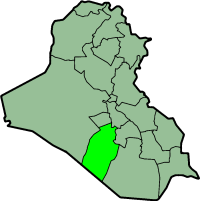Najaf Province facts for kids
Najaf (Arabic: النجف) is an important province in southwestern Iraq. It is known for its rich history and religious significance. The province covers a large area of about 28,824 square kilometers. This is roughly the size of a country like Rwanda. The main city and capital of the province is also called Najaf. Around 1.477.134 people live in this province, making it a lively and busy place.
Contents
About Najaf Province
Najaf Province is located in the desert region of Iraq. It is part of the larger Mesopotamia area, which is famous for being one of the cradles of civilization. The province's capital city, Najaf, is one of the holiest cities for Shia Muslims. Millions of pilgrims visit it every year.
Where is Najaf Located?
Najaf Province is in the southwestern part of Iraq. It shares borders with other Iraqi provinces like Karbala to the north and Muthanna to the south. To the west, it borders Saudi Arabia. This location makes it a key area for travel and trade in the region.
What is Najaf Like?
The land in Najaf Province is mostly desert. You will find flat plains and some sand dunes. Despite the dry climate, the Euphrates River is not far away. This river is a vital source of water for farming and daily life in nearby areas. The weather can be very hot in summer and mild in winter.
Important Cities in Najaf
The most important city in the province is Najaf City. It is a major center for religious learning and pilgrimage. Another notable city is Kufa, which is historically significant. Kufa was once an important Islamic city and played a big role in early Islamic history.
Economy and Life in Najaf
The economy of Najaf Province relies heavily on religious tourism. Many people visit the holy sites in Najaf City, which brings business to hotels, restaurants, and shops. Agriculture is also important, especially in areas near water sources. Farmers grow dates, grains, and other crops. Some people also work in small businesses and services.
Education and Culture
Najaf is a famous center for religious education. It has many seminaries and schools where students learn about Islamic studies. The city's libraries hold ancient manuscripts and books. This makes Najaf a place of deep learning and cultural heritage. The people of Najaf are known for their hospitality and strong community ties.
See also
 In Spanish: Gobernación de Nayaf para niños
In Spanish: Gobernación de Nayaf para niños
 | Frances Mary Albrier |
 | Whitney Young |
 | Muhammad Ali |


